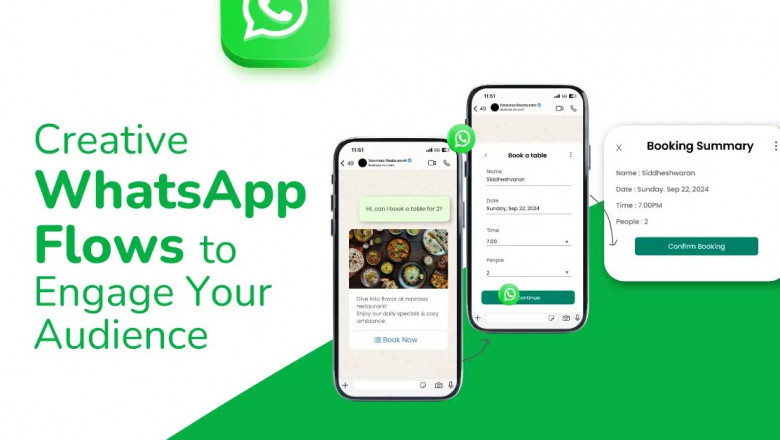views
In the fast-paced digital world, businesses are constantly searching for innovative ways to enhance customer engagement and streamline operations. One such groundbreaking feature is WhatsApp Flows, a solution designed to automate and simplify customer interactions through pre-designed workflows.
This article explores how WhatsApp Flows are transforming business communication, their key features, and how they contribute to operational efficiency and improved customer experiences.
What Are WhatsApp Flows?
WhatsApp Flows are pre-configured, interactive workflows that businesses can implement to guide customers through specific processes on WhatsApp. These flows use the power of automation to facilitate seamless communication, whether it’s onboarding a new customer, resolving queries, or completing transactions. By leveraging WhatsApp Flows, businesses can deliver personalized and efficient customer journeys without manual intervention.
Key Features of WhatsApp Flows
1. Interactive Automation
WhatsApp Flows enable businesses to automate customer interactions with dynamic, step-by-step processes. Customers can navigate menus, select options, and receive instant responses, enhancing their experience.
2. Personalized Customer Journeys
With WhatsApp Flows, businesses can customize workflows based on customer preferences, behaviors, or queries, ensuring tailored interactions that drive satisfaction.
3. Multimedia Support
These flows support rich media formats, including images, videos, and documents, making communication more engaging and informative.
4. Seamless Integrations
WhatsApp Flows can integrate with CRMs, payment gateways, and other business tools to create a unified ecosystem for managing customer interactions.
5. Real-Time Updates
Customers receive real-time updates on their queries, orders, or processes, ensuring transparency and building trust.
Benefits of WhatsApp Flows for Businesses
1. Enhanced Customer Engagement
WhatsApp Flows provide an interactive platform that keeps customers engaged. Automated responses and intuitive menus make it easier for users to find solutions, boosting satisfaction.
2. Streamlined Operations
By automating repetitive tasks like FAQs, appointment bookings, or order tracking, businesses can focus on more strategic initiatives. This increases efficiency and reduces operational costs.
3. Improved Lead Conversion
WhatsApp Flows guide prospects through the sales funnel with automated follow-ups, reminders, and tailored recommendations, leading to higher conversion rates.
4. 24/7 Availability
Unlike manual processes, WhatsApp Flows operate round the clock, ensuring customers always have access to assistance, regardless of time zones.
5. Scalable Solutions
From small businesses to large enterprises, WhatsApp Flows cater to varying volumes of customer interactions, making them ideal for scaling operations.
Use Cases of WhatsApp Flows
1. Customer Support
WhatsApp Flows can handle common customer queries, such as troubleshooting steps or account information updates, reducing the need for live agents.
2. Appointment Scheduling
Businesses like clinics, salons, and service centers can use flows to automate appointment bookings and reminders, ensuring efficiency and minimizing no-shows.
3. E-Commerce and Order Management
E-commerce businesses can automate order confirmations, delivery updates, and return processes, enhancing the post-purchase experience.
4. Feedback Collection
With WhatsApp Flows, businesses can automate surveys and feedback forms, gathering valuable insights into customer satisfaction.
5. Onboarding New Customers
Onboarding workflows guide customers through account setup, product tutorials, and initial usage steps, creating a smooth start for new users.
Real-World Examples of WhatsApp Flows
Case Study 1: E-Commerce Retailer
An online retailer implemented WhatsApp Flows for order tracking and returns. Customers could check their order status and initiate returns through a simple interactive menu. This reduced customer support tickets by 40% and improved satisfaction ratings.
Case Study 2: Healthcare Provider
A clinic used WhatsApp Flows for appointment bookings and follow-up reminders. Patients received automated updates and reminders, reducing missed appointments by 30% and enhancing operational efficiency.
Case Study 3: Education Platform
An online learning platform adopted WhatsApp Flows for student enrollment and course progress tracking. This streamlined the enrollment process and kept students informed about their schedules and milestones.
How to Implement WhatsApp Flows in Your Business
1. Identify Key Processes
Determine which customer interactions can benefit from automation, such as FAQs, bookings, or order updates.
2. Design User-Centric Workflows
Create intuitive flows that address common customer needs. Ensure the design is simple, interactive, and engaging.
3. Integrate with Existing Systems
Connect WhatsApp Flows with your CRM, inventory management, or payment systems to ensure seamless operations.
4. Test and Optimize
Run test scenarios to identify potential bottlenecks or improvements. Use customer feedback to refine workflows.
5. Monitor Performance
Track metrics like response time, completion rates, and customer satisfaction to measure the effectiveness of your flows.
The Future of WhatsApp Flows
As technology evolves, WhatsApp Flows will become even more sophisticated. Future developments may include:
-
AI-Powered Enhancements Integration with AI and machine learning will enable predictive analytics, smarter responses, and enhanced personalization.
-
Advanced Analytics Detailed insights into customer behavior and workflow performance will empower businesses to make data-driven decisions.
-
Omni-Channel Synchronization WhatsApp Flows will integrate with other messaging platforms, providing a unified customer experience across channels.
-
Industry-Specific Solutions Tailored workflows for sectors like healthcare, education, and logistics will further optimize operations in these fields.
Conclusion
WhatsApp Flows are revolutionizing how businesses communicate and interact with customers. By automating workflows, enhancing engagement, and streamlining operations, they empower companies to achieve greater efficiency and customer satisfaction. Whether you’re a small business or a large enterprise, adopting WhatsApp Flows can transform your operations and drive growth in the competitive digital landscape.






















Comments
0 comment